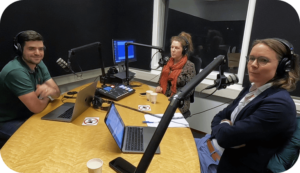 We often talk about the lack of research and funding for tinnitus. But what about the quality of research? Do tinnitus sufferers benefit from the research that is conducted? In reality, many studies are conducted improperly, thus giving misleading results and false promises for patients.
We often talk about the lack of research and funding for tinnitus. But what about the quality of research? Do tinnitus sufferers benefit from the research that is conducted? In reality, many studies are conducted improperly, thus giving misleading results and false promises for patients.
During this episode, we dive deep into concepts like research design, patient selection, outcome measures, statistical analysis, and everything else required for high-quality studies. We focus on studies that assess tinnitus interventions; in other words, studies that measure the effectiveness of new treatments. How do we ensure that such studies generate valuable information for patients?
We discuss these topics with Inge Stegeman, an epidemiologist from the University of Utrecht, and Jorge Simões, Assistant Professor in data science and mental health at the University of Twente.
Want to see a video version of this interview – and at the same time support our work?
Become a Patreon for as little as $2/month!
Want to read a transcript of the interview?
We have prepared one for you. Click here for the transcript (PDF).
Skip to: 00:00 Why Is This Topic Important?
We often talk on this podcast about more funding being needed for research. But really, it’s just as much about conducting research in the right way, not wasting the opportunity to learn something new, and communicating openly and honestly about the evidence for or against a treatment.
Skip to: 16:15 Things That Can Go Wrong in Designing a Study.
Skip to: 24:55 How Do We Measure the Success of Clinical Trials?
Those 13-15 points increase or decrease in a questionnaire. What about quality of life, psychological well-being, effect, positive or negative?
Skip to: 29:40 Bias in Patient Selection.
Skip to: 35:54 Open Science and the Importance of Being Systematic.
Skip to: 39:24 Breaking Out of Research Silos.
I think we also should be very critical about collecting new data each and every time. Everyone always wants to collect their own data.
Skip to: 46:06 The Importance of Negative Results.
Skip to: 49:43 Being Honest About Study Outcomes.
We as researchers really have to take the responsibility for that and we shouldn’t let people go through the hassle of finding out themselves if those papers and those articles and the data is correct. That is just ridiculous, right?
Skip to: 55:59 Reasons for Optimism.
Skip to: 58:39 Unifying Tinnitus Research.
Discuss on Tinnitus Talk Forum